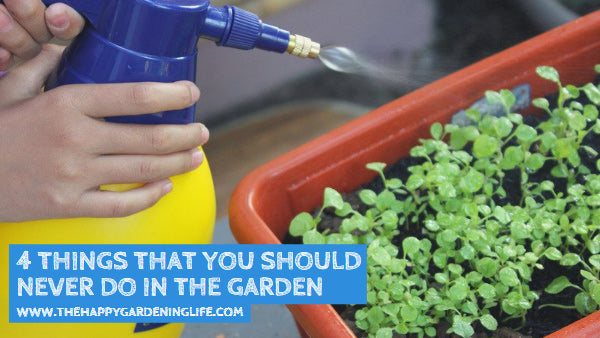
4 Things That You Should Never Do in the Garden
Share
 It’s only natural to make mistakes when you’re gardening, but there are certain errors that can prove catastrophic for your garden. These mistakes may seem inconsequential at first, but they can be damaging if you’re not careful.
It’s only natural to make mistakes when you’re gardening, but there are certain errors that can prove catastrophic for your garden. These mistakes may seem inconsequential at first, but they can be damaging if you’re not careful.
It definitely helps to be aware of the different gardening don’ts so you can protect the vegetable garden that you’ve worked hard for. To avoid making costly mistakes, always keep these things in mind:
Don’t overfeed your garden with fertilizer
Only use fertilizer when your soil has a nutrient deficiency that needs to be fixed. Adding more fertilizer is not a guarantee that your crops will grow better; vegetable plants only absorb nutrients right when they need them, so it’s actually wasteful to put too much in the soil.
Don’t apply synthetic fertilizer
This type of fertilizer contains chemicals that are harmful to plants. Instead, go natural and make your own compost to achieve a healthier garden.
Don’t use any form of pesticides
Using pesticides will only put your plants at risk and kill the beneficial bugs that your garden needs. It’s best to just give up pesticides altogether and adopt greener methods such as companion planting and creating your own organic pest control sprays at home.
Read more below to learn more about these important gardening don’ts. Don’t forget to share this blog post on Facebook, Twitter and Pinterest today!
4 Important Gardening Don’ts to Bear in Mind
1. Don’t Over Fertilize
Fertilizers should really only be used when there is a nutrient deficiency in the soil. Plants are going to only take up nutrients as they need them, and any others that are added to the soil will only go to waste. This is especially true when it comes to nitrogen.
2. Don’t Use Synthetic Fertilizers
Throw those bottles of synthetic fertilizers away and opt for creating your own organic compost, use earthworm castings, fish and seaweed emulsions, and leaf mold instead. In fact, if you use these amendments you can reduce, or even eliminate the need for fertilizers all together. Your vegetable garden will grow ten times better and be far more healthy.
3. Don’t Plant in Too Much Shade
Planting vegetables in a shady area is a really big no-no. There are a handful of veggies that do not mind a little shade, such as lettuces and peas, but most vegetables need at least six to eight hours of direct sunlight in order to thrive. Less than that and you could end up with underperforming plants.
If you are starting your first vegetable garden make sure to watch the sun throughout the season to find the area that gets the best sunlight. It’s better to check the sunlight in the spring, summer, and fall because what is sunny in early spring might be shaded in summer once the trees have filled with leaves.
4. Don’t Use Broad Spectrum Pesticides
The problem with pesticides is that you may end up killing the nasty insect that wreaking havoc, but you are also killing the beneficial insects like bees, ladybugs and lacewings that might be visiting your garden.
Whenever you come across a pest issue it is important to identify the culprit first. Once you have the pest named then you can come up with selective means of deterring, or eliminating, the pest from your garden. Many times there is an organic solution for dealing with a pest that is much better for the health of your garden, and your family.
Article Source: veggiegardener.com
